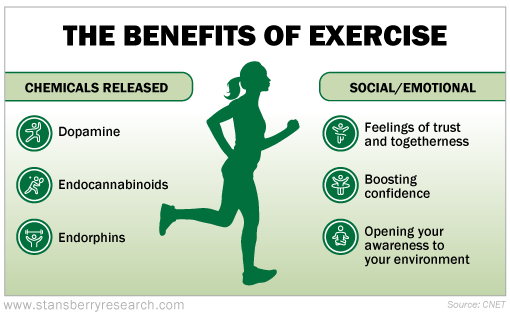Fix Your Bad Mood With Some Exercise
Several years ago, during one of my stays at the Loews Regency Hotel on Park Ave in New York City, I found my exercise footing in a Peloton bike. With that first ride, I was hooked.
These days, I have my own Peloton at home (and confess I now only stay at hotels that have a Peloton bike). I use it roughly every other day. I also subscribe to the exercise programs that come with it and have tried most of the categories – my favorites being the 30-minute boot camps or the biking-with-arms workouts.
When I've finished my session, I always feel better than when I started, and my head always feels much clearer.
Here's the thing, folks, it's as simple as this...
Doing a little bit of exercise every day is going to make you feel good.
That's because when you exercise, your body receives "good" energy on both a chemical and a social/emotional level...

Chemically, exercise causes the body to produce and make use of a number of elements that are all associated with feeling good.
1. Dopamine – Dopamine is a chemical messenger for neurons (called a neurotransmitter) that is made in the brain and is released when you're expecting a reward. Dopamine contributes to feelings of alertness, focus, motivation, and happiness. A flood of dopamine can even make you feel euphoric.
Research tells us that regular exercise can increase our dopamine levels. A 2014 study measured the blood levels of dopamine in 104 men aged 20 to 50 before and after three months of completing a daily one-hour yoga practice. A significant increase in dopamine was detected in the participants aged 20 to 39 after three months of yoga practice.
2. Endocannabinoids – Endocannabinoids are molecules made by our bodies on an "as needed" basis and help to regulate a number of processes in your body – including mood. They do this by suppressing the release of neurotransmitters in response to environmental stimuli.
We're still learning about endocannabinoids, but a new study published in April found that they're responsible for the euphoric runner's high that people can experience when participating in endurance exercise...
A runner's high – characterized by feelings of euphoria and the absence of anxiety – used to be attributed to the work of endorphins. However, this latest study found that people still experience a runner's high when their endorphin receptors were chemically blocked, because they were still able to receive the endocannabinoids being released by the body after 45 minutes of running.
This makes a lot of sense to the science community because endorphins cannot pass the blood-brain barrier – which would be needed to create the "high" feeling in the brain – but endocannabinoids can.
3. Endorphins – Small chemicals that act on the nervous system, so-called neurochemicals, are known as endorphins. Endorphins are natural pain relievers and are released in response to pain, stress, and other activities – like exercise. They act on the opiate receptors in our brain, so while they reduce pain, they also increase pleasure and our sense of wellbeing.
Studies show that endorphins relieve depression, reduce stress and anxiety, and boost self-esteem.
The Social and Emotional Benefits of Exercise
1. Feelings of trust and togetherness – When we exercise with others, we actually get more pleasure from being around them... A 2018 study looked at 191 older couples for 14 days and found that on days when people exercised, more positive marital events were reported, as was a higher daily marital satisfaction.
When you exercise with other people or with a group, you develop a closeness that causes you to see your workout buddies as sources of support. That's why people tend to follow a fitness "tribe" like Peloton or CrossFit gym members.
2. Boosting confidence – The relationship between exercise and self-esteem has been widely studied. There is even an Exercise and Self-Esteem: Rationale and Model developed in 1989 which states that regular physical exercise leads to enhanced self-esteem.
And while confidence and self-esteem aren't exactly the same – confidence is a belief in one's abilities and self-esteem is a belief about our sense of self – people with high self-esteem tend to be confident as well.
Turns out, the more we exercise, the more confidence and self-esteem we build.
Additionally, the confidence gained from accomplishing a difficult fitness routine or goal (especially alongside other people) extends beyond the gym... It empowers you to take on the other challenges in your life. It also causes you to feel more optimistic and connected to a community that's bigger than just you.
3. Opening your awareness to your environment – When you exercise outdoors, your mood and the presence of any underlying anxiety or depression is impacted right away... This is because your brain state changes to become more open and aware of yourself and your surroundings, much like when you meditate.
Think of it as the harmonizing of your mind and body. You find anchors for your attention in the motions and your focus narrows to occupy only the present moment.
When you exercise, you get to do good for your body and your mind all at once. Do what I do and aim for at least 30 minutes of exercise five times a week. Typically, a good mood will go into effect in just five minutes after starting some form of moderate exercise. This is why you should just put your socks and shoes on and go for it.
Let us know what some of your favorite exercises are... We're always eager to try new things... Drop us a line at feedback@healthandwealthbulletin.com.
What We're Reading...
- Something different: Children's healthiest meal of the day comes from school cafeterias.
Here's to our health, wealth, and a great retirement,
Dr. David Eifrig and the Health & Wealth Bulletin Research Team
June 29, 2021

